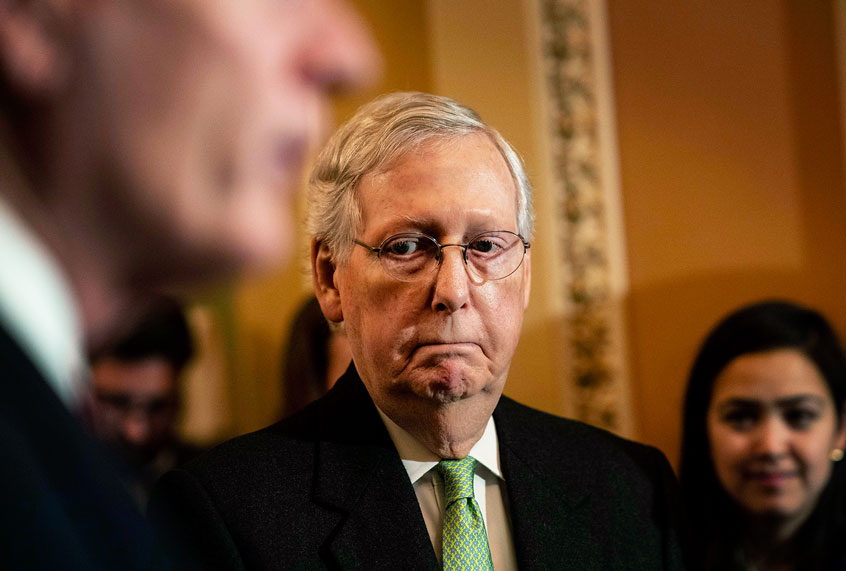Senate Majority Leader Mitch McConnell, R-Ky., is poised to violate his oath of office with his handling of President Donald Trump’s impeachment trial in the Senate, according to a constitutional law professor.
In a blistering editorial published in McConnell’s hometown newspaper, The Courier-Journal, Boston College Law professor and Kentucky native Kent Greenfield cautioned the Republican leader that his “loyalty to Trump should not overwhelm his loyalty to the Constitution.” If McConnell does not ensure that a Senate impeachment is conducted fairly, he could violate the Constitution’s oath to fair trials, Greenfield warned.
Greenfield wrote that Article I of the Constitution grants the Senate the sole” power to “try all impeachment,” and requires that “when sitting for that purpose, they shall be on oath or affirmation.”
“This special oath only kicks in when the Senate tries an impeachment,” Greenfield explained. “The framers wanted to make sure the Senate would never take such a trial lightly — this oath requirement is over and above the oath each senator has already taken to support the Constitution.”
The Constitution does not spell out the specific words of the oath, but the Senate rules do. The rules state senators must “solemnly swear (or affirm, as the case may be) that in all things appertaining to the trial of the impeachment of ____ ____, now pending, I will do impartial justice according to the Constitution and laws: So help me God.”
McConnell has already given several indications that he will not act as an “impartial juror” during Trump’s Senate trial, and has even said that he is “in total coordination with the White House counsel’s office” and “taking my cues from the president’s lawyers.”
In the editorial, Greenfield noted: “This is not a time for political cynicism or constitutional faithlessness. McConnell’s loyalty to Trump should not overwhelm his loyalty to the Constitution. If he fails in this, he is not only violating his Article I oath but his Article VI oath.”
Greenfield went on to praise McConnell’s Democratic counterpart, Senate Minority Leader Chuck Schumer, D-N.Y., for “hitting the correct tone” by calling on the upper chamber to hear testimony from four administration witnesses who have not previously testified in the inquiry, including acting White House chief of staff Mick Mulvaney and former national security adviser John Bolton. Schumer has also called on the Senate to subpoena documents, which the Trump administration has refused to turn over.
Over the past few days, McConnell and Schumer have publicly feuded over their competing views about the parameters of a Senate impeachment trial. Because the Constitution does not detail the parameters of a trial, a simple majority of senators need to set rules for the proceedings.
The impasse has prompted Speaker of the House Nancy Pelosi, D-Calif., to suggest that she may not submit the two articles of impeachment against Trump — abuse of power and obstruction of Congress — to the upper chamber unless McConnell and Schumer broker a deal on the rules governing the trial.
There is no constitutional requirement mandating that the articles of impeachment be sent to the Senate within a certain timeframe — or even at all — but a Senate trial can only kick off once the articles are delivered. The standoff between McConnell and Schumer could force Trump to wait indefinitely to be acquitted by the GOP-controlled Senate.
Democrats who favor delaying sending the articles of impeachment to the Senate believe the move could put pressure on McConnell to compromise on a rules package for a trial. Those opposed have expressed concern that withholding the articles could be interpreted as a game of political chess, which could ultimately backfire.
In the op-ed, Greenfield criticized the Republican Party for declaring that the “whole process is based on hearsay,” a claim which he argued could be “easily ameliorated by hearing from more people who have direct knowledge of Trump’s mendacity, abuse of power and attempts at cover-ups.”
“Short of declaring war, the Senate is about to conduct its gravest and most serious constitutional obligation — to exercise the ‘sole power to try’ impeachments,” he concluded. “All senators should take their obligation of faithful impartiality seriously, especially McConnell. History is watching, and it will be a harsh judge.”

